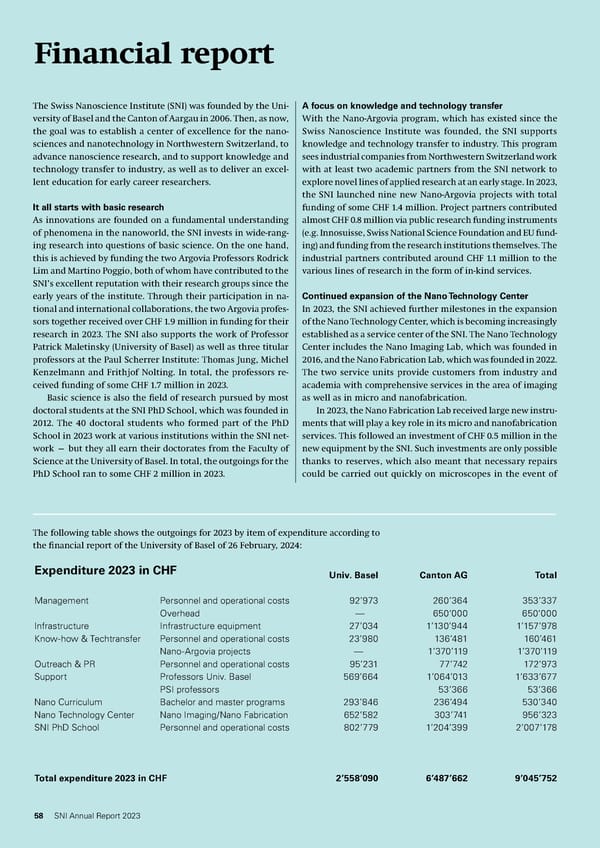Financial report The Swiss Nanoscience Institute (SNI) was founded by the Uni- A focus on knowledge and technology transfer versity of Basel and the Canton of Aargau in 2006. Then, as now, With the Nano-Argovia program, which has existed since the the goal was to establish a center of excellence for the nano- Swiss Nanoscience Institute was founded, the SNI supports sciences and nanotechnology in Northwestern Switzerland, to knowledge and technology transfer to industry. This program advance nanoscience research, and to support knowledge and sees industrial companies from Northwestern Switzerland work technology transfer to industry, as well as to deliver an excel- with at least two academic partners from the SNI network to lent education for early career researchers. explore novel lines of applied research at an early stage. In 2023, the SNI launched nine new Nano-Argovia projects with total It all starts with basic research funding of some CHF 1.4 million. Project partners contributed As innovations are founded on a fundamental understanding almost CHF 0.8 million via public research funding instruments of phenomena in the nanoworld, the SNI invests in wide-rang- (e.g. Innosuisse, Swiss National Science Foundation and EU fund- ing research into questions of basic science. On the one hand, ing) and funding from the research institutions themselves. The this is achieved by funding the two Argovia Professors Rodrick industrial partners contributed around CHF 1.1 million to the Lim and Martino Poggio, both of whom have contributed to the various lines of research in the form of in-kind services. SNI’s excellent reputation with their research groups since the early years of the institute. Through their participation in na- Continued expansion of the Nano Technology Center tional and international collaborations, the two Argovia profes- In 2023, the SNI achieved further milestones in the expansion sors together received over CHF 1.9 million in funding for their of the Nano Technology Center, which is becoming increasingly research in 2023. The SNI also supports the work of Professor established as a service center of the SNI. The Nano Technology Patrick Maletinsky (University of Basel) as well as three titular Center includes the Nano Imaging Lab, which was founded in professors at the Paul Scherrer Institute: Thomas Jung, Michel 2016, and the Nano Fabrication Lab, which was founded in 2022. Kenzelmann and Frithjof Nolting. In total, the professors re- The two service units provide customers from industry and ceived funding of some CHF 1.7 million in 2023. academia with comprehensive services in the area of imaging Basic science is also the 昀椀eld of research pursued by most as well as in micro and nanofabrication. doctoral students at the SNI PhD School, which was founded in In 2023, the Nano Fabrication Lab received large new instru- 2012. The 40 doctoral students who formed part of the PhD ments that will play a key role in its micro and nanofabrication School in 2023 work at various institutions within the SNI net- services. This followed an investment of CHF 0.5 million in the work — but they all earn their doctorates from the Faculty of new equipment by the SNI. Such investments are only possible Science at the University of Basel. In total, the outgoings for the thanks to reserves, which also meant that necessary repairs PhD School ran to some CHF 2 million in 2023. could be carried out quickly on microscopes in the event of The following table shows the outgoings for 2023 by item of expenditure according to the 昀椀nancial report of the University of Basel of 26 February, 2024: Expenditure 2023 in CHF Univ. Basel Canton AG Total Management Personnel and operational costs 92’973 260’364 353’337 Overhead — 650‘000 650‘000 Infrastructure Infrastructure equipment 27’034 1’130’944 1’157’978 Know-how & Techtransfer Personnel and operational costs 23’980 136’481 160’461 Nano-Argovia projects — 1’370’119 1’370’119 Outreach & PR Personnel and operational costs 95’231 77’742 172’973 Support Professors Univ. Basel 569’664 1’064’013 1’633’677 PSI professors 53’366 53’366 Nano Curriculum Bachelor and master programs 293’846 236’494 530’340 Nano Technology Center Nano Imaging/Nano Fabrication 652’582 303’741 956’323 SNI PhD School Personnel and operational costs 802’779 1’204’399 2’007’178 Total expenditure 2023 in CHF 2’558’090 6’487’662 9’045’752 58 SNI Annual Report 2023
 Annual Report 2023 Page 57 Page 59
Annual Report 2023 Page 57 Page 59